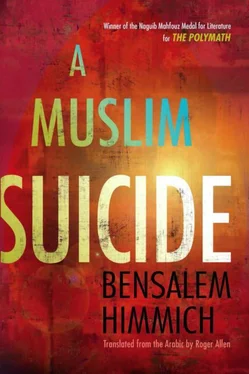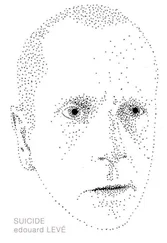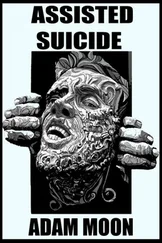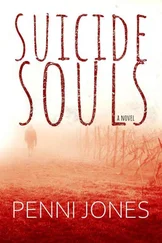In this piece of advice from Ibn Khalas's retainer I detected a direct warning.
"Once I get to Tunis with God's help," I responded by way of a challenge, "I intend to be very circumspect. But tell me, apart from pretending to be blind, what other secrets are you harboring?"
"You'll not be able to get me to share with you information that only my master the governor knows. But what I can tell you is that I'm on my way to convey to Abu Zakariyya Ibn Khalas's renewal of Hafsid control and to consult him on a variety of secret matters."
"My dear envoy," I told him, "you can assume that I share the same earnest hopes as Ibn Khalas when it comes to his wishes and aspirations regarding the Hafsid sultan."
"No, my good shaykh," he replied. "Politicians deal with matters of this world, while saints of God are concerned with those of the next. Every person is competent to deal with those matters for which he was created. What's more, my master doesn't like company or competition when it comes to politics!"
A drumbeat now announced that the caravan was about to depart. I got to my feet and stood in front of my host, saying no more for fear of bringing our discussion to an undesirable conclusion. He came over to me and clasped me to him with probing hands, while his servants prepared his riding animal. Whispering in my ear, he confided that a sign of how much he trusted me was that he was prepared to let me choose between riding with the caravan or else leaving it and traveling on my own. I told him that my intention was to head at speed for Bijaya. He then advised me to take the coast road by day so as to avoid the risk of being waylaid by bandits, not to mention holding on to my regal mount and the valuable baggage I was carrying.
I took some deep breaths of the air in the Banu Khalid mountains, keen as I was to build up my strength and follow the advice I used to give my own pupils and adherents with regard to keeping my nerve and staying on task. After preparing my horse for the journey, I sat down under an isolated, leafy tree close by, relishing its shade and pondering my state. By so doing I was hoping to turn into an ascending light that would serve a useful purpose. I pictured myself as a hovering angel, wings fluttering at times and outspread at others, while the wind beneath it pointed it in whichever direction seemed appropriate.
So there I was, a hovering angel weaving to and fro in the firmament of my own mind or floating on high in the realms of contemplation and observation, when I heard the tones of the muezzin calling people to prayer in Badis's single mosque. I went down there to perform the noon prayer. Once I had found someone to look after my horse, I mingled with the congregation. I was horrified to see some worshippers either sitting or prostrating themselves all the time and not changing their position either during the prayers or afterward. I looked for the imam of the mosque (who was stringing out the chanting of the verses), offered him my greetings, and asked him what was going on with these worshippers. He took me over to a corner and informed me that they were all drug addicts. Rubbing my hands together in dismay, I asked God to forgive them all. Just then a man grabbed me by the sleeve and asked me my name, where I had come from, and what was my destination. When I gave him a terse response, he accompanied me outside, asking me to explain a complex passage in the Qur'an as he did so; an itinerant jurist had talked to him about it a year ago, but had not come up with an explanation. It lay in the interpretation of the verse "Say, if the Merciful had a child, I would be the first of worshippers" [Sura 43, v. 81].
"God knows best," I said as I began my response, "but perhaps by the word `worshippers' here is meant `unbelievers,' since the Arabs are known to say, `he denied me my rights,' meaning `he disbelieved me."'
I handed the imam some money to spend on those unfortunates. While he was thinking about my interpretation or contemplating my gift, I mounted my horse and took off apace toward the east.
From Badis, my first stop on the journey, I passed by Melila, Hanin, Wahran, and Tannis. In each place I stayed for a day or just a few hours in order to visit mosques and bathhouses, catch up on some sleep, and eat in some hostels. During my travels I almost came to grief in the desert region near Tannis when I was attacked by a group of robbers on horseback (who seemed to be uncouth Bedouin). I only managed to escape thanks to my magnificent Arabian stallion, which easily outpaced them.
In the city of Algiers itself I only spent a couple of days. At dawn on the second day I set out-as though impelled by some gentle, yet insistent force-and headed for Bijaya. I took the sea route so that I could both rest my horse and relax a little myself after the pressures of being permanently on the lookout for danger and the need to move at speed. While traveling by sea, I slept a lot and indulged in inward contemplation; I actually said and did very little. During my ruminations I thought about the huge number of concepts to be contemplated and the paucity of words to express them; about the human tragedy of sheer ignorance, idiotic feuding, and a failure to achieve any mutual understanding between peoples. Anyone who spotted me lost in thought and completely oblivious to my surroundings would certainly have imagined that I had somehow been brought low by either bankruptcy or despair. The truth of the matter was quite the opposite: my entire being and mental acuity was focused on the noblest and mightiest of ideas: prime amongst them was, of course, God, the steadfast creator of all, who envelops within His universal vision everything that is seen and unseen; it is toward Him that I strive to approach with my enlightened essence and laudable endeavors.
As the sailboat traversed the waves in much the same state as myself, it rocked me from side to side, and I was able to fill my lungs with fresh sea breezes. While I was in such a blissful state, how I wished for an angel to tear open my heart and purge it of all foul pollutants. Then I would have breathed in the pure scent of the blissful folk who are close to God's throne!
I ARRIVED IN BIJAYA in the evening and went looking for a hotel; I found one without difficulty. After the first night, I decided that I would extend my stay in this city; it felt as though I was tied to it in some way. After breakfast I made myself known to the warden of the hotel and entrusted the care of my horse to him. Then I headed for the nearest public bath to rid myself of the journey's grime. In the large city mosque I performed both the noon and afternoon prayers. While waiting for sunset, I took the opportunity to go and see the Pearl Palace, the architectural glory of the city, and the high mountains that surround it as its most obvious natural feature. I then did a tour through the quarters and markets, relying on being a stranger in these parts. I was completely fascinated as I infiltrated myself among its regular inhabitants and visitors.
In a central square people were gathered in groups, some of them to chat and exchange gossip, others to listen. There were bards and storytellers too, recounting tales of heroic sagas and literary salons; some of them were singing or chanting either accompanied by musical instruments or without. I was particularly attracted by one of them who sang the following ditty:

Once he had finished, an incredible musician in the middle of the group began playing the flute, as though he were from the line of the Prophet David himself. He was an unbelievably skillful singer and drum player, one who could readily switch from poems and liturgies in praise of the Prophet to secular Andalusian love poems. My, 0 my, what amazing talent he possessed, especially when it came to crafting his envois and zajals!
Читать дальше













